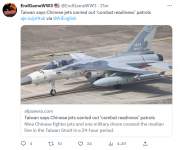You are using an out of date browser. It may not display this or other websites correctly.
You should upgrade or use an alternative browser.
You should upgrade or use an alternative browser.
WAR CHINA THREATENS TO INVADE TAIWAN
- Thread starter danielboon
- Start date
jward
passin' thru
EndGameWW3
@EndGameWW3
German minister heading to Taiwan, first such visit in 26 years German minister heading to Taiwan, first such visit in 26 years via @AJEnglish
View: https://twitter.com/EndGameWW3/status/1636868782445457410?s=20
@EndGameWW3
German minister heading to Taiwan, first such visit in 26 years German minister heading to Taiwan, first such visit in 26 years via @AJEnglish
View: https://twitter.com/EndGameWW3/status/1636868782445457410?s=20
jward
passin' thru
Taiwan’s military shelves controversial proposal amid criticism it would reinstate secret police of ‘White Terror’ era
Proposed amendment, now on hold, would expand government control over civilians, speech and supplies during wartime
Critics say it could hand ruling DPP power to sway media and silence dissent, much like ‘KMT Gestapo’ of martial law period
Taiwan’s military has agreed to temporarily put on hold its proposed amendments to a wartime law following criticism that the revision would reinstate the draconian secret police set up to silence dissent in the “White Terror” era.
“There is no timetable for the amendments,” Defence Minister Chiu Kuo-cheng said, referring to the All-out Defence Mobilisation Readiness Act, which would give the military the power to mobilise not only its active soldiers and reservists but also civilians to prepare for war with mainland China.
Beijing, which sees Taiwan as part of its territory and does not renounce the use of force to take it under control, has intensified its military operations around the self-ruled island in recent months. US and Taiwanese experts have warned the moves could be a prelude to cross-strait conflict.
Under the proposed amendments, all media organisations, online platforms, information networks and television broadcasters would be required to cooperate with government controls during the mobilisation period.
Offenders who spread misinformation or rumours endangering society and the public could face three years in prison or a NT$1 million (US$32,500) fine. Penalties for media outlets would be even higher.
Education authorities would also be required to compile a list of all students in Taiwan aged 16 and above and provide the information to the All-Out Defence Mobilisation Agency to help it tabulate the exact number of people it could mobilise to help in wartime.
People who fail to follow government prohibitions on hoarding goods or raising prices in wartime would face up to seven years in prison and a fine of up to NT$5 million.
Every Saturday
The proposed revisions also call for a penalty of up to seven years in jail and NT$7 million in fines for those who fail to comply with wartime mobilisation or requisition orders.
Without a clear definition, authorities could take advantage of the mobilisation decree and control local media and businesses, they said.
Currently, the act defines two broad categories of mobilisation: the “mobilisation preparation stage” and the “mobilisation implementation stage”, which refers to mobilisations announced by the president in times of national emergency or war.
“The proposal fails to denote the time frame of mobilisation preparation,” said Wu Sz-huai, a legislator with the Kuomintang, the main opposition party, and a retired lieutenant general.
Unlike the “mobilisation implementation stage”, which clearly occurs during wartime, the phrase “mobilisation preparation phase” is ambiguous, as it could cover peacetime as well, Wu noted.
With tensions running high across the Taiwan Strait, the ruling Democratic Progressive Party authorities could always claim it was time to prepare for mobilisation, Wu said.
“Such ambiguity would give the DPP government a blank cheque to declare preparation for mobilisation, thus allowing it to have absolute control of the media to silence dissenting voices, even if it is not wartime,” Wu said.
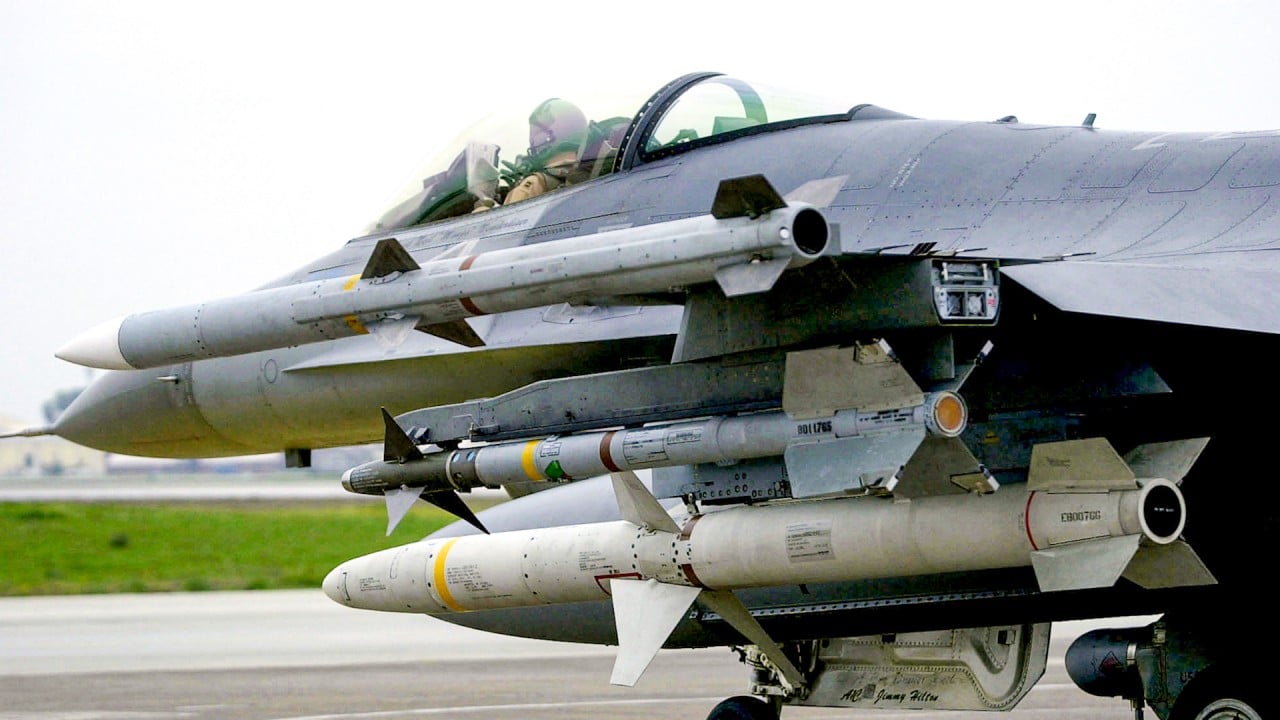
02:58
China denounces US approval of US$619 million sale of missiles and military equipment to Taiwan
“No one would dispute the revision of the act to give the authorities the power to control the media during wartime, but it is tantamount to reinstating the Taiwan Garrison Command if there is no specific mention of when mobilisation preparation should happen, and the DPP can decide when it should start,” he said.
The Taiwan Garrison Command was a secret police body that existed from 1945 to 1992, when the KMT was in power. It was responsible for suppressing opposition voices and activities.
The command was notoriously known as the “KMT Gestapo” for its persecution of hundreds of dissidents – some secretly executed – during the “White Terror” period, which ended when martial law was lifted in 1987. After the end of martial law, the command focused on controlling speech and press freedom until it was finally disbanded in 1992.
“It would help the [DPP] authorities to remain in power if they invoke the revised law to control the media, the market, financial and business activities at their defined mobilisation preparation time even if there is no apparent sign of a cross-strait conflict,” Kuo said.
The proposed amendment to require education authorities to provide a list of students aged 16 and above sparked fears among Taiwanese parents that their children might be sent to war or made to help in manufacturing munitions.
“The 16-year-olds are still in their first year of senior high school and have yet to take the civil defence education course. How would they expect them to go to war without training?” said Wang Han-yang, director of the Student Parents Department of Action Alliance on Basic Education, a non-profit group that monitors education policy.
DPP legislature caucus head Ker Chien-min said without clear explanation to political parties and communication with the public, the proposed revisions would only create misunderstanding.
He also dismissed speculation that students aged 16 and above would be made to help in producing weapons or put into active military service during wartime.
“All those who join the military must be 18 years old or above … and the defence ministry will not require the 16-years-olds to fight in a war,” he said.
But he admitted the proposed amendments still needed further consideration and the defence ministry would discuss with various government agencies and hold more public hearings before seeking approval from the legislature.
Chiu also said the revisions had nothing to do with pressure from the US as some lawmakers had suggested, but rather the need to amend the act to spell out different responsibilities in the event of a mobilisation.
The US has suggested that Taiwan should upgrade its military and civil defence training to tackle the growing threats from Beijing.
Proposed amendment, now on hold, would expand government control over civilians, speech and supplies during wartime
Critics say it could hand ruling DPP power to sway media and silence dissent, much like ‘KMT Gestapo’ of martial law period
Taiwan’s military has agreed to temporarily put on hold its proposed amendments to a wartime law following criticism that the revision would reinstate the draconian secret police set up to silence dissent in the “White Terror” era.
“There is no timetable for the amendments,” Defence Minister Chiu Kuo-cheng said, referring to the All-out Defence Mobilisation Readiness Act, which would give the military the power to mobilise not only its active soldiers and reservists but also civilians to prepare for war with mainland China.
Beijing, which sees Taiwan as part of its territory and does not renounce the use of force to take it under control, has intensified its military operations around the self-ruled island in recent months. US and Taiwanese experts have warned the moves could be a prelude to cross-strait conflict.
https://www.scmp.com/news/china/pol...ainland-china?module=hard_link&pgtype=article
As tensions have mounted in the Taiwan Strait, the island’s military hopes to revise the act to fully address a potential wartime situation.Under the proposed amendments, all media organisations, online platforms, information networks and television broadcasters would be required to cooperate with government controls during the mobilisation period.
Offenders who spread misinformation or rumours endangering society and the public could face three years in prison or a NT$1 million (US$32,500) fine. Penalties for media outlets would be even higher.
Education authorities would also be required to compile a list of all students in Taiwan aged 16 and above and provide the information to the All-Out Defence Mobilisation Agency to help it tabulate the exact number of people it could mobilise to help in wartime.
People who fail to follow government prohibitions on hoarding goods or raising prices in wartime would face up to seven years in prison and a fine of up to NT$5 million.
Every Saturday
The proposed revisions also call for a penalty of up to seven years in jail and NT$7 million in fines for those who fail to comply with wartime mobilisation or requisition orders.
Taiwan unveils a home-grown ‘kamikaze’ portable attack drone
The proposal sparked criticism from lawmakers and the public for giving the island’s authorities a blank cheque in the event of an “all-out mobilisation” – without defining when exactly “mobilisation preparation” should take place.Without a clear definition, authorities could take advantage of the mobilisation decree and control local media and businesses, they said.
Currently, the act defines two broad categories of mobilisation: the “mobilisation preparation stage” and the “mobilisation implementation stage”, which refers to mobilisations announced by the president in times of national emergency or war.
“The proposal fails to denote the time frame of mobilisation preparation,” said Wu Sz-huai, a legislator with the Kuomintang, the main opposition party, and a retired lieutenant general.
Unlike the “mobilisation implementation stage”, which clearly occurs during wartime, the phrase “mobilisation preparation phase” is ambiguous, as it could cover peacetime as well, Wu noted.
With tensions running high across the Taiwan Strait, the ruling Democratic Progressive Party authorities could always claim it was time to prepare for mobilisation, Wu said.
“Such ambiguity would give the DPP government a blank cheque to declare preparation for mobilisation, thus allowing it to have absolute control of the media to silence dissenting voices, even if it is not wartime,” Wu said.

02:58
China denounces US approval of US$619 million sale of missiles and military equipment to Taiwan
China denounces US approval of US$619 million sale of missiles and military equipment to Taiwan
Julian Kuo, a political commentator and former DPP legislator, said the lack of specifics was the core problem with the proposed revisions.“No one would dispute the revision of the act to give the authorities the power to control the media during wartime, but it is tantamount to reinstating the Taiwan Garrison Command if there is no specific mention of when mobilisation preparation should happen, and the DPP can decide when it should start,” he said.
The Taiwan Garrison Command was a secret police body that existed from 1945 to 1992, when the KMT was in power. It was responsible for suppressing opposition voices and activities.
The command was notoriously known as the “KMT Gestapo” for its persecution of hundreds of dissidents – some secretly executed – during the “White Terror” period, which ended when martial law was lifted in 1987. After the end of martial law, the command focused on controlling speech and press freedom until it was finally disbanded in 1992.
“It would help the [DPP] authorities to remain in power if they invoke the revised law to control the media, the market, financial and business activities at their defined mobilisation preparation time even if there is no apparent sign of a cross-strait conflict,” Kuo said.
https://www.scmp.com/news/china/dip...sh-its-allies?module=hard_link&pgtype=article
Taiwanese President Tsai Ing-wen of the independence-leaning DPP will end her current term next year, and her deputy William Lai has indicated his intention to run for president in JanuaryThe proposed amendment to require education authorities to provide a list of students aged 16 and above sparked fears among Taiwanese parents that their children might be sent to war or made to help in manufacturing munitions.
“The 16-year-olds are still in their first year of senior high school and have yet to take the civil defence education course. How would they expect them to go to war without training?” said Wang Han-yang, director of the Student Parents Department of Action Alliance on Basic Education, a non-profit group that monitors education policy.
DPP legislature caucus head Ker Chien-min said without clear explanation to political parties and communication with the public, the proposed revisions would only create misunderstanding.
https://www.scmp.com/news/china/pol...-tone-beijing?module=hard_link&pgtype=article
In a legislature meeting on March 7, Defence Minister Chiu said the proposed amendments were intended to boost public morale by preventing the spread of misinformation during wartime and would never affect people’s rights during peacetime.He also dismissed speculation that students aged 16 and above would be made to help in producing weapons or put into active military service during wartime.
“All those who join the military must be 18 years old or above … and the defence ministry will not require the 16-years-olds to fight in a war,” he said.
But he admitted the proposed amendments still needed further consideration and the defence ministry would discuss with various government agencies and hold more public hearings before seeking approval from the legislature.
Chiu also said the revisions had nothing to do with pressure from the US as some lawmakers had suggested, but rather the need to amend the act to spell out different responsibilities in the event of a mobilisation.
The US has suggested that Taiwan should upgrade its military and civil defence training to tackle the growing threats from Beijing.
ralfy
Member

Taiwan's former President Ma to visit China in landmark trip – DW – 03/20/2023
The visit will take place amid heightened tensions as Chinese military jets continue to enter contested air space. Former President Ma saw the sides grow closer while in office.
Related:
danielboon
TB Fanatic
EndGameWW3
@EndGameWW3
·
2m
U.S. Warns China Not to Use Taiwan President’s U.S. Visit to Raise Tensions https://wsj.com/articles/u-s-warns-china-against-using-taiwan-presidents-u-s-stop-to-raise-tensions-77deb0bf… via
@WSJ
https://t.co/gEGMfy33lK
@EndGameWW3
·
2m
U.S. Warns China Not to Use Taiwan President’s U.S. Visit to Raise Tensions https://wsj.com/articles/u-s-warns-china-against-using-taiwan-presidents-u-s-stop-to-raise-tensions-77deb0bf… via
@WSJ
https://t.co/gEGMfy33lK
danielboon
TB Fanatic
EndGameWW3
@EndGameWW3
·
9m
Update: Cambodian Prime Minister Hun Sen: The issuance of an arrest warrant for Russian President Vladimir Putin by the International Criminal Court (ICC) could lead to nuclear war, as well as creating other implications globally.
ralfy
Member
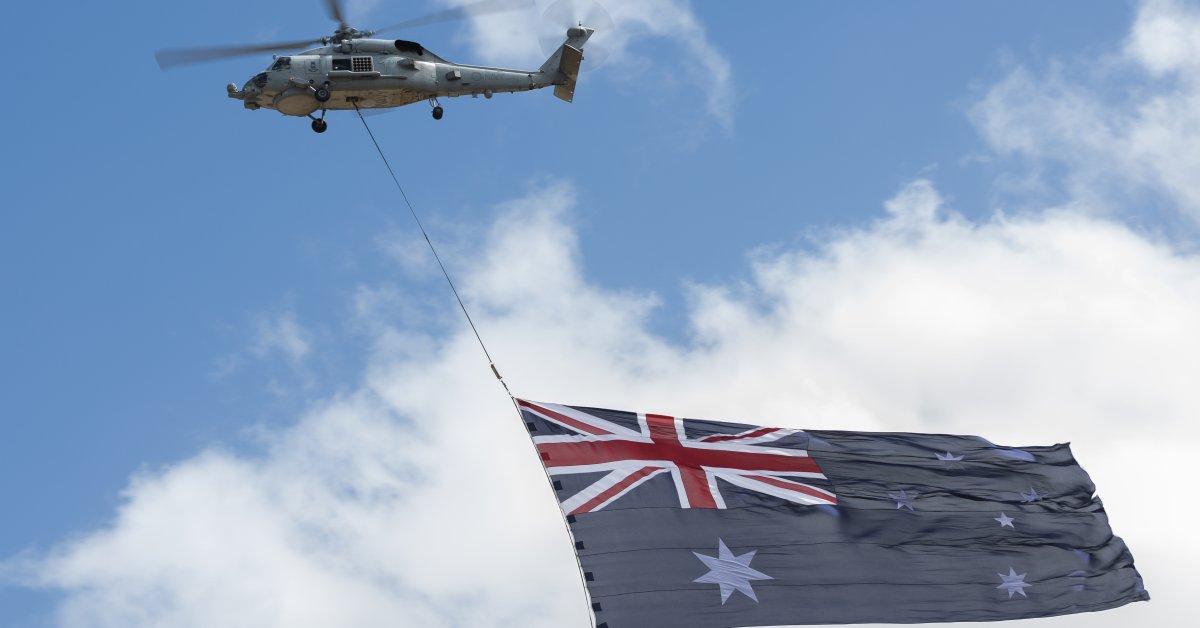
Australia Says It’s Not Committed to Siding With U.S. in Potential Taiwan Conflict
The Australian defense minister says his country has made no promises to the United States that Australia would support its ally in any future conflict over Taiwan in exchange for American nuclear-powered submarines
jward
passin' thru
LTG (R) Mike Flynn
@GenFlynn
The overextension of Athens happened in much the same vein. Our military leaders need to ensure they don’t allow themselves to be tail wagged here. We’re over committed in the M.E., Europe, Africa, the Indo-Pacific (our largest and most clear and present threat AOR), even Central and S.A. (The war on drugs, illegal invasion, etc) all of which threaten our capabilities and capacity to achieve global dominance. The Military leaders can say what they want, but these are real and very serious problems. They need to take a stand and let the National Command Authority know that not everything can be priority number one. I’m seriously concerned for our country and these, among others, are some of the reasons why.
@robert_spalding
View: https://twitter.com/GenFlynn/status/1638677867545370630?s=20
@GenFlynn
The overextension of Athens happened in much the same vein. Our military leaders need to ensure they don’t allow themselves to be tail wagged here. We’re over committed in the M.E., Europe, Africa, the Indo-Pacific (our largest and most clear and present threat AOR), even Central and S.A. (The war on drugs, illegal invasion, etc) all of which threaten our capabilities and capacity to achieve global dominance. The Military leaders can say what they want, but these are real and very serious problems. They need to take a stand and let the National Command Authority know that not everything can be priority number one. I’m seriously concerned for our country and these, among others, are some of the reasons why.
@robert_spalding
View: https://twitter.com/GenFlynn/status/1638677867545370630?s=20
jward
passin' thru
No imminent threat of China invading Taiwan, says senior U.S. official
By Xinghui Kok
SINGAPORE, March 23 (Reuters) - The United States does not see an imminent threat of China invading Taiwan but is ready to defend the self-ruled island, a senior U.S. official said on Thursday in Singapore.
Tensions have simmered between the two major powers as China becomes more assertive in its territorial claims over Taiwan and in the South China Sea, while the United States shores up alliances across the Asia-Pacific region to counter Beijing's influence.
"I don't certainly see any imminent threat. Hopefully that is something that would never materialise," U.S. Air Force Secretary Frank Kendall said on the sidelines of a defence technology conference in Singapore.
"Anyone who contemplates an act of aggression that would involve the United States is making a very serious mistake," he said.
Beijing reacted with fury last year when former U.S. House Speaker Nancy Pelosi visited Taiwan, launching live-fire military drills around the island. Beijing sees Taiwan as an inalienable part of China.
Kendall said China has done "a number of things that are fairly aggressive", including "militarising" the South China Sea, the strategic trade corridor in which several countries have overlapping claims.
China claims most of the waterway as its territory and has said the United States is the biggest driver of militarisation in the region.
The Chinese military said on Thursday it monitored and drove away a U.S. destroyer that had illegally entered waters around the Paracel Islands in the South China Sea. The U.S. Navy said China's statement was inaccurate.
Kendall also pointed to the presence of a suspected Chinese surveillance balloon in U.S. airspace in February as an "act of aggression" but said it was "not a serious military threat" and unlikely to happen again.
Beijing denied the balloon was a government spy craft.
Kendall called on the two countries to work together, saying "we should be working to increase our cooperation, not decreasing (it)".
/cloudfront-us-east-2.images.arcpublishing.com/reuters/VWBAK37B3ZPD3JDNQPB3UDUBYY.jpg)
 www.reuters.com
www.reuters.com
By Xinghui Kok
SINGAPORE, March 23 (Reuters) - The United States does not see an imminent threat of China invading Taiwan but is ready to defend the self-ruled island, a senior U.S. official said on Thursday in Singapore.
Tensions have simmered between the two major powers as China becomes more assertive in its territorial claims over Taiwan and in the South China Sea, while the United States shores up alliances across the Asia-Pacific region to counter Beijing's influence.
"I don't certainly see any imminent threat. Hopefully that is something that would never materialise," U.S. Air Force Secretary Frank Kendall said on the sidelines of a defence technology conference in Singapore.
"Anyone who contemplates an act of aggression that would involve the United States is making a very serious mistake," he said.
Beijing reacted with fury last year when former U.S. House Speaker Nancy Pelosi visited Taiwan, launching live-fire military drills around the island. Beijing sees Taiwan as an inalienable part of China.
Kendall said China has done "a number of things that are fairly aggressive", including "militarising" the South China Sea, the strategic trade corridor in which several countries have overlapping claims.
China claims most of the waterway as its territory and has said the United States is the biggest driver of militarisation in the region.
The Chinese military said on Thursday it monitored and drove away a U.S. destroyer that had illegally entered waters around the Paracel Islands in the South China Sea. The U.S. Navy said China's statement was inaccurate.
Kendall also pointed to the presence of a suspected Chinese surveillance balloon in U.S. airspace in February as an "act of aggression" but said it was "not a serious military threat" and unlikely to happen again.
Beijing denied the balloon was a government spy craft.
Kendall called on the two countries to work together, saying "we should be working to increase our cooperation, not decreasing (it)".
/cloudfront-us-east-2.images.arcpublishing.com/reuters/VWBAK37B3ZPD3JDNQPB3UDUBYY.jpg)
No imminent threat of China invading Taiwan, says senior U.S. official
The United States does not see an imminent threat of China invading Taiwan but is ready to defend the self-ruled island, a senior U.S. official said on Thursday in Singapore.
jward
passin' thru
taiwannews.com.tw
TAIPEI (Taiwan News) — After meeting with Russian President Vladimir Putin this week in Moscow, Chinese leader Xi Jinping (習近平) returned to China with a clearer Russian statement in support of Beijing’s false claims over Taiwan.
Following a three-day trip to Russia, Xi returned to China on Wednesday (March 22). Xi spent around 10 hours with Putin during his visit, including informal talks, a Monday (March 20) state dinner, and a summit on Tuesday (March 21), according to Nikkei.
The talks led to a joint statement that included a significant change on Taiwan, per the report. The statement said Russia “firmly supports” actions China takes to safeguard its sovereignty and territorial integrity.
Russia “recognizes Taiwan is an inalienable part of China’s territory,” the joint statement said. In prior statements, Moscow had only observed the “one China” principle and opposed Taiwan independence, which the new joint statement also included.
Chinese officials were upset that Russia had not made it clear before how it would respond if Beijing were to attempt to take Taiwan by force, per Nikkei.
Taiwan’s Ministry of Foreign Affairs on Wednesday issued a statement condemning the Chinese and Russian joint statement, according to CNA. “The Ministry of Foreign Affairs solemnly protests and strongly condemns (China’s) authoritarian expansionist government for continuing to issue false statements in the international arena to belittle and damage our country’s sovereignty,” the statement said.
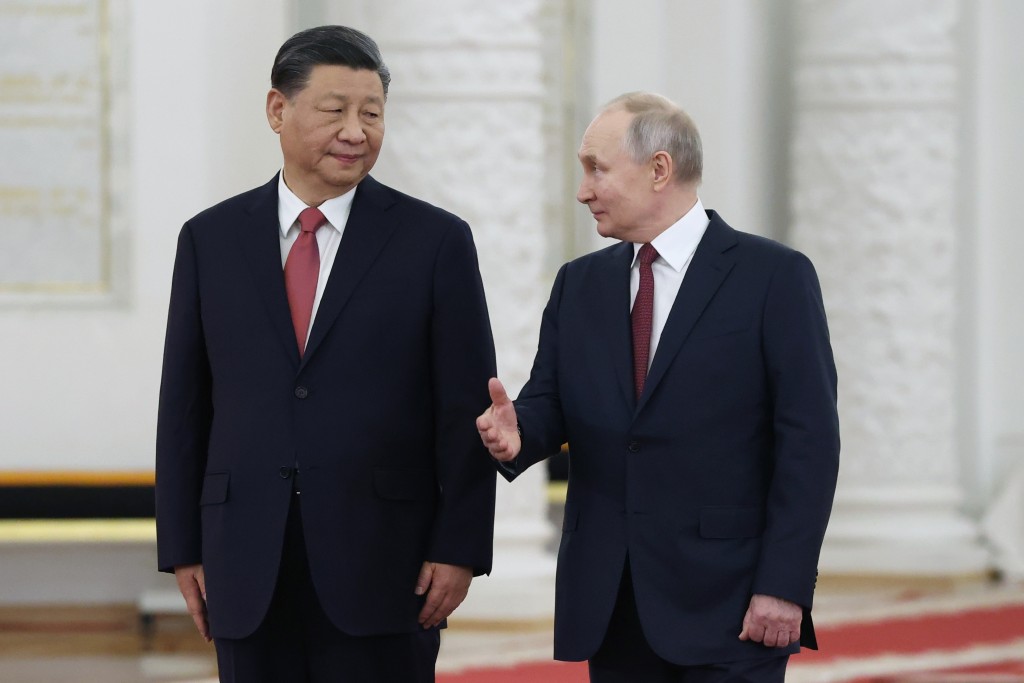
 www.taiwannews.com.tw
www.taiwannews.com.tw
China gets further backing on Taiwan from Russia
Taiwan News
Joint statement says Russia ‘firmly supports’ action China takes to safeguard its sovereignty and territorial integrity
TAIPEI (Taiwan News) — After meeting with Russian President Vladimir Putin this week in Moscow, Chinese leader Xi Jinping (習近平) returned to China with a clearer Russian statement in support of Beijing’s false claims over Taiwan.
Following a three-day trip to Russia, Xi returned to China on Wednesday (March 22). Xi spent around 10 hours with Putin during his visit, including informal talks, a Monday (March 20) state dinner, and a summit on Tuesday (March 21), according to Nikkei.
The talks led to a joint statement that included a significant change on Taiwan, per the report. The statement said Russia “firmly supports” actions China takes to safeguard its sovereignty and territorial integrity.
Russia “recognizes Taiwan is an inalienable part of China’s territory,” the joint statement said. In prior statements, Moscow had only observed the “one China” principle and opposed Taiwan independence, which the new joint statement also included.
Chinese officials were upset that Russia had not made it clear before how it would respond if Beijing were to attempt to take Taiwan by force, per Nikkei.
Taiwan’s Ministry of Foreign Affairs on Wednesday issued a statement condemning the Chinese and Russian joint statement, according to CNA. “The Ministry of Foreign Affairs solemnly protests and strongly condemns (China’s) authoritarian expansionist government for continuing to issue false statements in the international arena to belittle and damage our country’s sovereignty,” the statement said.

China gets further backing on Taiwan from Russia | Taiwan News | 2023-03-23 15:51:00
Joint statement says Russia ‘firmly supports’ action China takes to safeguard its sovereignty and territorial integrity | 2023-03-23 15:51:00
danielboon
TB Fanatic
China, U.S. Navy in row over guided-missile destroyer in South China Sea
301By REUTERS
2023/03/24 22:30
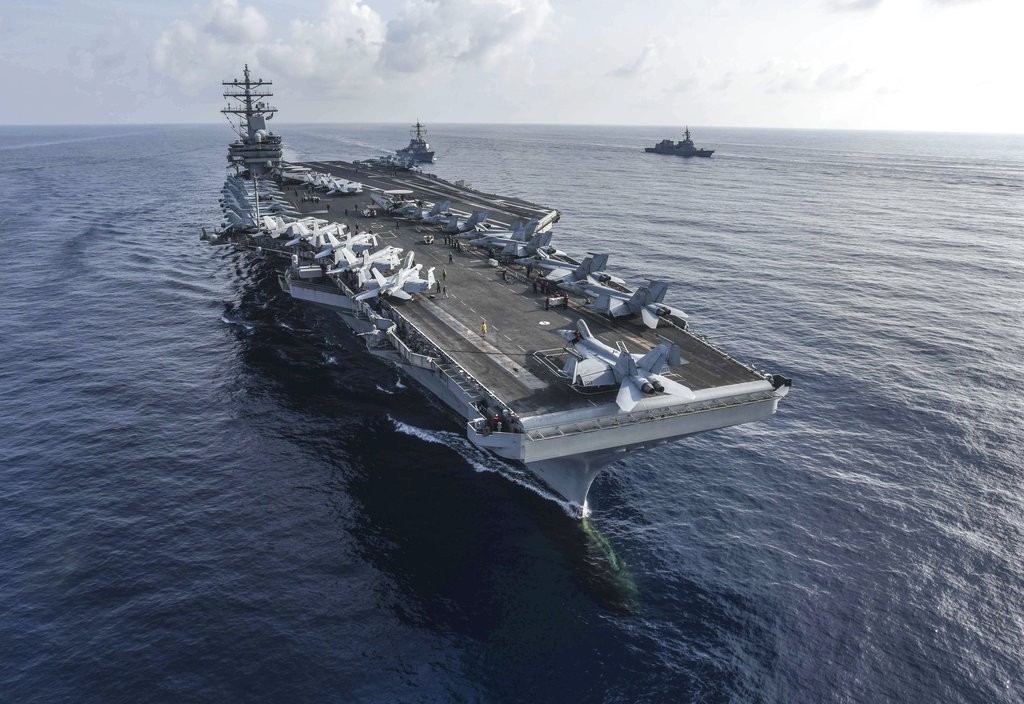
This Aug. 31, 2018, photo released by U.S. Navy, the aircraft carrier USS Ronald Reagan, front, and the guided-missile destroyer USS Milius, center, c... (AP photo)
BEIJING, March 24 (Reuters) - China's defence ministry said on Friday that it yet again had to monitor and drive away the U.S. Navy destroyer USS Milius that entered its territorial waters in the South China Sea near the Paracel Islands.
"We sternly demand the U.S. to immediately stop such provocative acts, otherwise it will bear the serious consequences of unforeseen incidents," a spokesperson said in a statement from the Ministry of National Defence.
The U.S. Navy said the guided-missile destroyer was asserting its navigational rights and freedoms.
"Unlawful and sweeping maritime claims in the South China Sea pose a serious threat to the freedom of the seas, including the freedoms of navigation and overflight, free trade and unimpeded commerce, and freedom of economic opportunity for South China Sea littoral nations," the U.S. Navy 7th fleet said in an emailed statement.
U.S. forces operate in the South China Sea on a daily basis, the U.S. Navy said.
It was the second straight day of a stand-off between the two super powers amid growing tensions in the South China Sea.
China claims vast swathes of the area that overlap with exclusive economic zones of various countries including the Philippines. Trillions of dollars in trade flow every year through the waterway. China, U.S. Navy in row over guided-missile destroyer in South China Sea | Taiwan News | 2023-03-24 22:30:00
danielboon
TB Fanatic
US 'Tiger Team' ensuring Taiwan's defense against China
Secretary of defense forms 'Tiger Team' to address 'logjam' with Taiwan's military orders
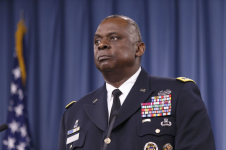
By Keoni Everington, Taiwan News, Staff Writer
2023/03/24 13:04
"U.S. Secretary of Defense Lloyd J. Austin. (White House website photo)
"]https://tnimage.s3.hicloud.net.tw/photos/2023/03/24/1679634189-641d2f0d50c92.jpg[/IMG]
U.S. Secretary of Defense Lloyd J. Austin. (White House website photo)
TAIPEI (Taiwan News) — U.S. Secretary of Defense Lloyd J. Austin said on Thursday (March 23) that he has formed a "Tiger Team" to ensure that Taiwan's military needs are met amid rising threats from China and "logjams" with weapons orders due to the war in Ukraine.
During a hearing of the House Appropriations Committee's defense subcommittee, Congressman Ken Calvert said every Taiwanese leader he met with during his recent visit to Taiwan had "remarked at the extremely slow pace of U.S. defense articles." He asked Austin and Joint Chiefs of Staff Army General Mark A. Milley what are Ukraine and Taiwan's "most critical defense needs" and what steps are being taken to expedite the shipment of weapons.
Austin responded by acknowledging "headwinds" due to the pandemic's impact on supply chains and struggles U.S. manufacturers have had keeping up with demand. He expressed optimism that U.S. weapons makers will eventually be able to alleviate the backlog in Foreign Military Sales (FMS).
The Secretary of Defense said that he created a "Tiger Team" months ago to deal with FMS shortfalls and "identify logjams and work through those logjams" to expedite production of crucial weapons systems. He also formed a group of senior leaders in the Department of Defense to focus on the issue on a weekly basis "to make sure that we are providing the right kinds of capability that Taiwan needs."
Austin closed by saying "this remains an area of focus for the department."
According to a report by The Wall Street Journal in September 2022, U.S. Deputy Secretary of Defense Kathleen H. Hicks signed a memorandum in August to establish a "Tiger Team" led by Sasha Baker, deputy under secretary of defense in charge of weapons procurement and logistical support. The team includes representatives from the armed services to examine inefficiencies in U.S. arms sales to foreign countries. US 'Tiger Team' ensuring Taiwan's defense against China | Taiwan News | 2023-03-24 13:04:00
danielboon
TB Fanatic
Taiwan orders 460 tank engines from the US
M60A3 tanks are effective against Chinese amphibious vehicles
1221By Matthew Strong, Taiwan News, Staff Writer
2023/03/24 14:05
[IMG alt="An M60A3 tank taking part in drills in Taoyuan City Thursday.
"]https://tnimage.s3.hicloud.net.tw/photos/2023/03/24/1679637454-641d3bce2e594.jpg[/IMG]
An M60A3 tank taking part in drills in Taoyuan City Thursday. (CNA photo)
TAIPEI (Taiwan News) — Taiwan has ordered 460 engines for its M60A3 TTS tanks on a budget of NT$7.24 billion ($238.92 million), reports said Friday (March 24).
For the past 30 years, the tank model has been the most prevalent in Taiwan’s military, serving on the islands of Kinmen and Penghu as well as on the east coast. However, the armed forces have run out of spare engines, requiring them to sign a new contract with Michigan-based RENK America, the manufacturer of the tanks.
The agreement, which remains valid until March 2028, also covers the upgrading of the weapons fire-control system, the Liberty Times reported. The new engines will be more reliable, resilient, and easier to maintain, according to the military.
The main target for the M60A3 during an armed conflict would be China’s amphibious landing vehicles, which would be at their most vulnerable while operating on beaches due to the absence of heavy armored plating. The tank took part in exercises simulating the repulsion of an enemy invasion on and around a beach in Taoyuan City Thursday (March 23). Taiwan orders 460 tank engines from the US | Taiwan News | 2023-03-24 14:05:00
northern watch
TB Fanatic
The Philippines’ proximity to Taiwan makes it central to Western strategy
America has secured access to nine military bases in its former Asian colony

Feb 21st 2023 | MANILA, TOKYO AND WASHINGTON, DC
The Economist
Among the ways in which great-power competition is reordering Asian geopolitics, a new Western focus on the Philippines stands out. The archipelago country of 115m people is not rich, spends little on defence and was until last year led by an anti-American populist. Yet Rodrigo Duterte’s successor, President Ferdinand “BongBong” Marcos, has returned the Philippines to its usual pro-Western posture. And with Taiwan on its doorstep, its location and long-standing ties to America have made the country central to Western strategy. As sparring between China and America grows nastier, officials in Washington say the Philippines has become as prominent in their security debates as any Asian country save China itself.
In February, during a second visit to Manila by America’s secretary of defence, Lloyd Austin, the Philippines announced a deal to allow American forces use of four, currently unspecified, military bases. Building on a previous agreement, the Enhanced Defence Co-operation Agreement (edca) of 2014, this gives America access to nine Philippine bases in all. The country’s two biggest bases, Clark and Subic Bay, are not expected to be among them.
Yet, significantly, the new pact will probably include two coastal bases in the northern province of Cagayan, less than 400km (250 miles) from the coast of Taiwan.

That makes them the closest possible launch-pad to the disputed island for American and allied forces, apart from one or two far-flung Japanese island bases, which would be harder to defend and supply. “New edca locations will allow our forces to respond rapidly to shared challenges in the Philippines as well as across the Indo-Pacific region,” says a Pentagon official. Other American allies are also investing in their relations with the country, including especially Japan, which sent two fighter jets to it for joint exercises late last year. It was the first time Japanese military planes had landed in the Philippines since the second world war.
America has dense ties with its former colony, underpinned by its large Filipino diaspora and elements of common culture. Filipinos are solidly pro-American. Even under Donald Trump, whom they strongly disliked, around 80% had a positive view of the superpower. America’s promise of protection, under the terms of a mutual-defence treaty the two countries signed in 1951, is also popular. In 2019 America ended decades of strategic ambiguity by confirming it would come to the Philippines’ aid if its vessels were attacked. On the day the enlarged basing deal was announced, America said it would restart joint patrols with its ally in the South China Sea.
The two countries have co-operated on security sporadically. The Philippines acted as an American logistical rearbase during the war in Vietnam and hosted American troops during the cold war. Subic Bay was at one time the biggest American military base outside America. In the early 1990s, a surge in Philippine nationalist sentiment led to America’s forces being banished from it and Clark base (named after an early American aviator, Harold M. Clark). Yet, a decade later, the 9/11 terrorist attacks ushered in a fresh burst of co-operation. Up to 1,300 American troops joined the fight against Islamist separatists in the southern Philippines. By reinvigorating military ties between the two countries,
Operation Enduring Freedom - Philippines, as the effort was called, was one of the more useful bits of the war on terror.
Mr Trump and Mr Duterte, who viewed China as a more reliable and lucrative partner, jeopardised that progress. In 2020 Mr Duterte threatened to end the two countries’ Visiting Forces Agreement, which permits American troops in the Philippines. Mr Trump welcomed this as an opportunity to “save a lot of money”. Yet Mr Duterte’s threat, later abandoned, proved to be a “crystallising moment” for the defence and foreign-policy establishments in Washington and Manila, says Gregory Poling of the Centre for Strategic and International Studies, a think-tank in Washington. They considered the relationship to be both important and undervalued. Mr Marcos, the son and namesake of a former dictator and American proxy (who fled to Hawaii after he was ousted in 1986), has turned out to be unexpectedly supportive of that view.
Despite sharing Mr Duterte’s desire for closer economic relations with China, he has proved a far more willing American security partner. Expanded Chinese drills around Taiwan last year, which brushed against Philippine territory, have encouraged him. “It’s very hard to imagine a scenario” where the Philippines could stay out of a war over Taiwan, he recently said. The Biden administration has pushed to seize the opportunity this represents. Last year it helped negotiate the sale of a bankrupt shipyard at Subic Bay—which two Chinese companies had expressed interest in buying—to an American private-equity firm, Cerberus Capital Management. The administration has also so far agreed to pay $82m to upgrade the infrastructure at five Philippine bases.
In October it provided Mr Marcos’s government with $100m in military funding, in part to help “offset” losses from an agreed 12bn-peso ($227m) purchase of Russian helicopters that it cancelled after Vladimir Putin invaded Ukraine. Under threat of Western sanctions, it had little alternative. Yet when compared with Mr Duterte’s former efforts to cosy up to Mr Putin, whom he once described as “my favourite hero”, the cancellation looked like further evidence of a pro-Western tilt.
The West has broadly welcomed it. Security co-operation between Japan and the Philippines has reached “a turning-point”, says Kiba Saya of Kobe City University of Foreign Studies. Beyond last year’s exercises, Japan has supplied a dozen patrol vessels to the Filipino coastguard. During a visit this month to Tokyo by Mr Marcos, the two countries signed a deal making it easier for Japanese forces to deploy to the Philippines on humanitarian missions. Mr Marcos said a trilateral security pact, also including America, was under discussion.
Poland in the Pacific
Australia, the only other country to have a Visiting Forces Agreement with the Philippines, has stepped up security co-operation. On February 22nd the two countries’ defence ministers met in Manila to discuss conducting joint patrols in the South China Sea. Earlier this month Britain and the Philippines held talks in Manila on maritime law enforcement. Last month France and Germany said they were willing to conduct trilateral maritime patrols with the Philippines. Canada has offered it investment and aid and hopes to sign a first defence framework with it by June.If America and China came to blows, little would be expected of the Philippines’ 140,000-strong armed forces. They are not equipped to first-world standards and largely focused on counter-insurgency operations. Yet playing the logistical-support role Western strategists envisage would still carry great risks for the Philippines, notes a retired Filipino general.
The threat of war with nato has made Poland’s eastern border an uncrossable line for Russia, even as Poland performs a similar role for Ukraine. By contrast, if China were already engaged in a war with America, there would be no fear of it provoking one by attacking the Philippines.
The country’s constitution forbids foreign troops from being permanently stationed on its territory. America’s will therefore be rotated through the bases available to them. Mr Marcos’s government may also be wary of taking Filipinos’ pro-Americanism for granted; foreign troops are often unpopular. Sensitive to such concerns, Pentagon officials stress the multifaceted nature of America’s commitment—they are as keen to talk up typhoon response as Taiwan. Ahead of the two countries’ annual “Balikatan” (“shoulder-to-shoulder” in Tagalog) military exercises in April, America will build a clinic in the northern town of Sarrat.
Yet such baubles are nothing to the economic contribution of China, the Philippines’ biggest trade partner. And Mr Marcos hopes to retain it. The president visited Beijing in January and was rewarded with $23bn in investment promises, including in sectors such as energy, on which the Philippines until recently placed foreign-ownership restrictions.
During last year’s Balikatan exercises, American troops staged an amphibious landing in Cagayan province. Chinese firms have proposed an array of projects along the surrounding coastline, including a “smart city” costing $2bn on nearby Fuga island. Filipino security experts protest when provincial governors wave through such projects. Cagayan’s governor, Manuel Mamba, meanwhile opposes the joint military exercises on the basis that they might scare away Chinese investment.
It is a reasonable concern. Chinese and Japanese investment has played a big part in raising the Philippines’ growth rate—to 7.6% last year. Yet Mr Marcos is in a bind. China’s near-constant bullying in the South China Sea “pushes us into a situation where we have a deeper military alliance with the us”, says Jose Manuel Romualdez, the Philippines’ ambassador to America. That, in turn, has made the country’s economic reliance on China less straightforwardly positive. Chinese firms own 40% of the Philippines’ electrical grid and much of its telecoms infrastructure. Equipment provided by Huawei, a Chinese telecoms giant, is allegedly being used in some of the military bases to which America has been granted access.
Maintaining the Philippines’ growth spurt will require more than such investment: it requires peace. And peace in the South China Sea, as Mr Marcos seems to have concluded, will depend on America and its allies maintaining an effective deterrence against Chinese aggression. ■

The Philippines’ proximity to Taiwan makes it central to Western strategy
America has secured access to nine military bases in its former Asian colony
jward
passin' thru
Factbox: And then there were 13: Taiwan's diplomatic allies
ReutersMarch 26 (Reuters) - Honduras has ended its decades-long relationship with Taiwan and said it only recognised China, leaving Taiwan with formal diplomatic relations with only 13 countries.
China views democratically governed Taiwan as part of its territory with no right to state-to-state ties, a position Taiwan's government strongly disputes.
Over the years, China has slowly whittled away at the number of countries that maintain formal diplomatic ties with Taiwan.
Following is a list of states that have diplomatic ties with Taiwan:
LATIN AMERICA AND CARIBBEAN
BelizeGuatemala
Paraguay
Haiti
Saint Kitts and Nevis
Saint Lucia
Saint Vincent and the Grenadines
PACIFIC
Marshall Islands
Nauru
Palau
Tuvalu
AFRICA
Eswatini
EUROPE
Vatican City
Update: US State Department: Honduras severing its relations with Taiwan is a sovereign decision, and we encourage all countries to expand their relations with Taipei.
danielboon
TB Fanatic
US military personnel reportedly spotted observing Taiwan Army drill
Taiwan's Eighth Army Corps exercise simulated real combat situations
1045By Kelvin Chen, Taiwan News, Staff Writer
2023/03/27 16:54
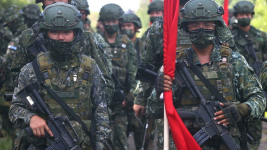
Soldiers march to position during annual Han Kuang military drill in Tainan on Sept. 14, 2021. (AP photo)
TAIPEI (Taiwan News) — U.S. military personnel were reportedly spotted at a Taiwan Army training session in Kaohsiung’s Gangshan District on Monday (March 27).
The 117th Brigade of the Army’s Eighth Corps conducted its new 14-day education and training session on Monday, simulating real combat situations including enemy forces approaching from the air, shelling, and gas attacks. The soldiers also went on a 5-km march.
As the troops trained, two foreigners were seen observing the drill and taking pictures. They are speculated to be U.S. military personnel but the Eighth Corps refused to comment on the matter.
The Wall Street Journal on Thursday (Feb. 23) cited U.S. officials as saying that 100 to 200 soldiers will be sent to Taiwan in the coming months. Around 39 troops and Department of Defense staff are reportedly stationed in Taiwan as of September 22, 2022, according to the latest DMDC report.
Additionally, U.S. Defense Secretary Lloyd Austin on March 23 told the House Appropriations Subcommittee on Defense that he has assembled a team to “really dig down into the FMS (Foreign Military Sales) issues and identify logjams, and work through those logjams to try to expedite the delivery of key platforms.” US military personnel reportedly spotted observing Taiwan Army drill | Taiwan News | 2023-03-27 16:54:00
northern watch
TB Fanatic
New Book:
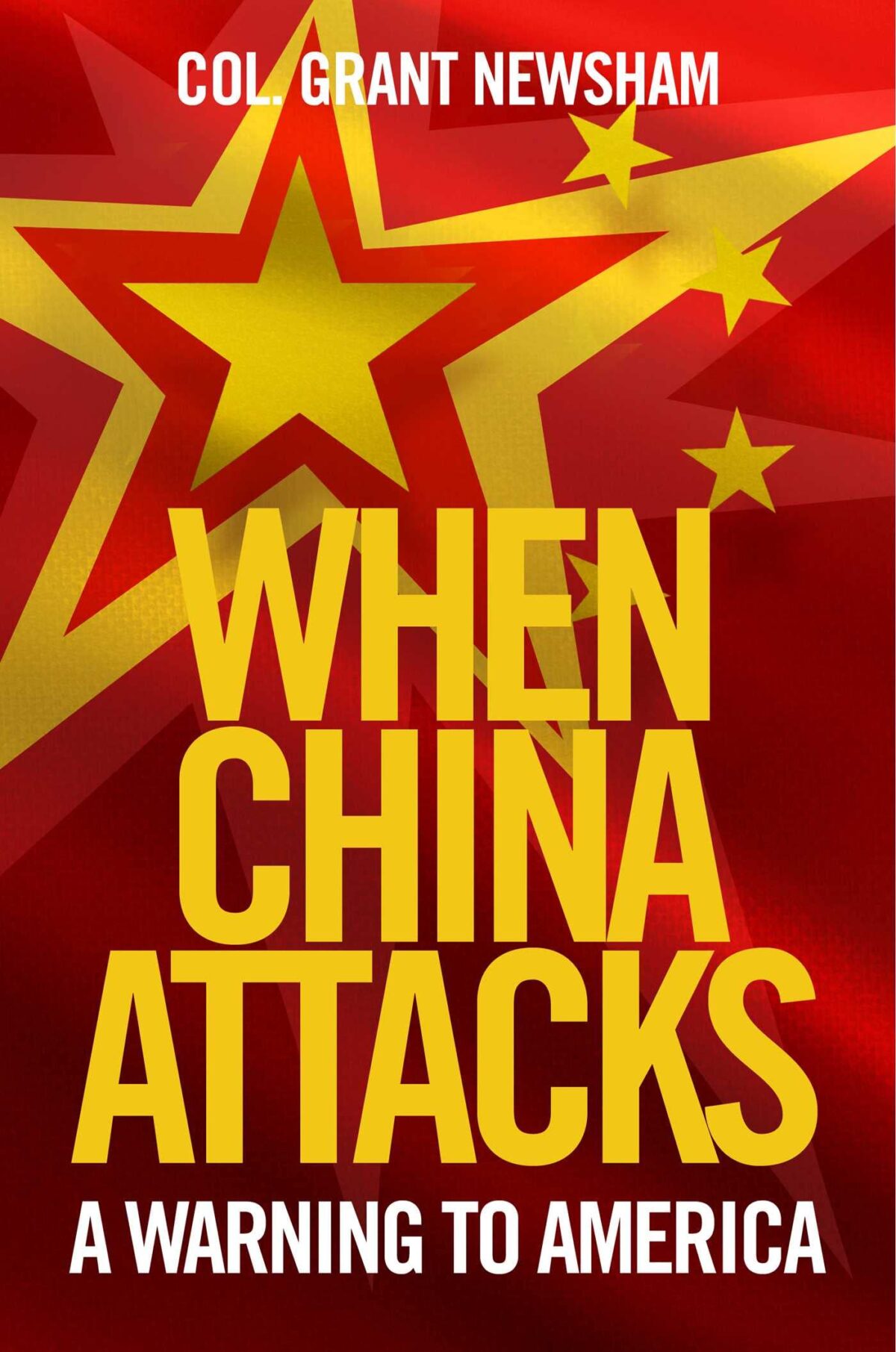
‘When China Attacks: A Warning to America’
By Col. Grant Newsham
Subtitled “A Warning to America,” Newsham’s book is important for several reasons. He imagines a Chinese seizure of Taiwan and its deadly consequences both for the Pacific region and America’s future. But he also describes in detail how China has waged a gray-zone war against the United States for decades with devastating effects on the American economy and its people and cities. He concludes with specific recommendations for resisting these assaults. This is a loud wake-up call for all Americans.
Regnery Publishing, 2023, 256 pages

‘When China Attacks: A Warning to America’
By Col. Grant Newsham
Subtitled “A Warning to America,” Newsham’s book is important for several reasons. He imagines a Chinese seizure of Taiwan and its deadly consequences both for the Pacific region and America’s future. But he also describes in detail how China has waged a gray-zone war against the United States for decades with devastating effects on the American economy and its people and cities. He concludes with specific recommendations for resisting these assaults. This is a loud wake-up call for all Americans.
Regnery Publishing, 2023, 256 pages
northern watch
TB Fanatic
Japan holds evacuation drills amid Taiwan invasion fear
William Yang in TaipeiDW
March 28 2023
8 hours ago 8 hours ago
Remote islands in Japan's Okinawa prefecture have begun evacuation drills amid worries that China could attack Taiwan. But experts doubt the effectiveness of such drills.
Citing the threat from China's aggressive military expansion, Japan has dramatically transformed its defense posture since last year, beefing up its defense budget, strengthening defense capabilities and deepening cooperation with key allies like the US and the Philippines.
Some of Japan's remote islands in the south are also enhancing their preparation for a potential military conflict across the Taiwan Strait. On March 18, Japan's Okinawa prefecture carried out its first simulated exercise that aims at evacuating around 100,000 residents from remote islands close to Taiwan. Officials are concerned about southern Japan being affected by a potential Chinese invasion of the self-ruled island, which China sees as part of its own territory. Both local and national authorities in Japan took part in the exercise which was staged in several cities on the Sakishima Islands, about 360 kilometers (224 miles) away from Taiwan.
According to Japanese media outlets, the drill simulated residents on smaller islands in the Okinawa prefecture first being taken to bigger islands like Ishigaki and Miyako, and then transferred to Okinawa's main island Kyushu. Apart from the 120,000 local residents and tourists being evacuated based on the exercise, around 1.4 million people living on or around the prefecture's main island were asked to hide indoors.
The authorities plan to extract people on civilian aircraft and vessels, and the local government in Okinawa would cooperate with airline and ferry companies or other transportation providers to complete the task. Local authorities estimated that the entire evacuation effort could take six days.
US bases in Japan could become targets
While officials in Okinawa try to downplay the correlation between the evacuation drills and the potential Chinese invasion of Taiwan, some experts say the proximity of Okinawa to both Taiwan and China, as well as the fact that it hosts US military bases, make the prefecture "an obvious target of a Chinese attack.""If China invades Taiwan, the People's Liberation Army (PLA) may also attack US military bases in Okinawa, which means Japan would be automatically dragged into a war with China," said Kyoko Hatakeyama, a professor at the University of Niigata Prefecture in Japan.
"Japan needs to avoid civilian deaths and casualties in Okinawa, and that's why evacuation drills are becoming more important," she told DW.
Last December, Japan's westernmost Yonaguni Island also held an evacuation drill over potential ballistic missile strikes. Yonaguni is only 110 kilometers away from Taiwan.

Yonaguni, Japan's westernmost island, has a population of around 1,700Image: Kota Kiriyama/AP/picture alliance
Government apologizes over J-Alert malfunction
Eleanor Hughes, a defense analyst at the Asia Group in the United States, told DW that the preparations are partly aimed at "bolstering synergies on crisis management" between authorities at different levels across Japan."One of the byproducts of these visible preparations is that it's more difficult for Japanese citizens to rule out the possibility that Japan can completely shield itself from feeling the reverberating effects of a contingency [of war], should one occur," she said.
But some experts express doubt about the effectiveness of these evacuation drills. They also note that Japan's warning system, the J-Alert system, malfunctioned when North Korea fired ballistic missiles over Japan last October. Japan's chief cabinet secretary was forced to apologize to the public over the incident.
"If the government's alert system seems to be dysfunctional, Japanese people may think: why should they be too troubled by the potential contingency?" said Jeff Kingston, director of Asian Studies at Temple University Japan (TUJ).
"Local governments in Japan have a long way to go to ensure people living on the remote islands have adequate support if any emergencies were to happen," he told DW.
According to Kingston, it is still unclear how much support local authorities would provide. Also, communication and transport links remain limited in Okinawa, which would in turn limit the effectiveness of any evacuation plans.
Ukraine war provides insights for Japan's civilian protection
Other analysts add that it is very difficult to actually evacuate tens of thousands of people from remote islands once a military conflict breaks out. They argue that the only way to ensure the safe evacuation of civilians under these circumstances is if the warring parties reach some tacit agreement."From Ukraine's experience, we know evacuating civilians is very hard to do [during a war] and mass evacuation is even harder to execute," said Koichi Nakano, a political scientist at Sophia University in Japan.
Both Kingston and Nakano point to Okinawa's brutal history during World War II. The island was the site of a battle between the US army and the Japanese forces in 1945, which killed more than 200,000 people. With that in mind, many local residents view the ongoing efforts and evacuation drills with skepticism and concern.
"Many people feel like there is once again preparation to use Okinawa as a buffer in a possible military confrontation," Nakano told DW.
"The government has no choice but to acknowledge that to a certain degree, Okinawa is less safe than it used to be, and that's why they have to conduct evacuation drills. But I don't think that can really reassure the local people," he added.
Sympathy for Taiwan in Japan
Tensions in the region were running especially high last summer, when senior US lawmaker Nancy Pelosi visited Taiwan. China saw the visit as implicit support to Taiwan's independence and responded by staging massive military drills, with several Chinese missiles reportedly landing in Japan's Exclusive Economic Zone.Residents of the Yonaguni Island, where evacuation drills were held in December, told Japan's daily Yomiuri Shimbun that this incident made them realize the rising military threat from across the Taiwan Strait.
Also in December, Japan revealed its biggest defense budget increase since WWII, aiming to raise the defense spending to 2% of GDP and strengthen its counterstrike capabilities. In its newly-released national security strategy, Tokyo characterized China as "the greatest strategic challenge ever to securing the peace and stability of Japan." It also highlighted the fact that Beijing hasn't ruled out the possibility of using force against Taiwan.
Kingston from Temple University Japan adds that issues related to Taiwan's security have been baked into Japan's foreign policy and there is longstanding sympathy and support for Taiwan in general. According to the expert, Tokyo's commitment to Taiwan will continue, regardless of who is in power.
Edited by: Darko Janjevic

Japan holds evacuation drills amid Taiwan invasion fear – DW – 03/28/2023
Remote islands in Japan's Okinawa prefecture have begun evacuation drills amid worries that China could attack Taiwan. But experts doubt the effectiveness of such drills.
danielboon
TB Fanatic
EndGameWW3
@EndGameWW3
·
47m
China threatens retaliation if House Speaker McCarthy meets with Taiwan's president https://nbcnews.com/news/world/china-taiwan-president-transit-us-tsai-ing-wen-kevin-mccarthy-rcna76938… via
@nbcnews
jward
passin' thru
South China Morning Post
@SCMPNews
17m
Taiwanese President Tsai Ing-wen arrived in New York, making a sensitive US stopover on March 29, 2023, before heading to Guatemala and Belize.
View: https://twitter.com/SCMPNews/status/1641349547610742785?s=20
@SCMPNews
17m
Taiwanese President Tsai Ing-wen arrived in New York, making a sensitive US stopover on March 29, 2023, before heading to Guatemala and Belize.
View: https://twitter.com/SCMPNews/status/1641349547610742785?s=20
jward
passin' thru
Taiwan speeds up preparation for potential conflict with China
By RFA Staff
Taiwan’s military is bolstering its preparation for a possible future war with China by planning an unprecedented military drill at a civilian airport this coming July, the official Central News Agency (CNA) reported.
The military aircraft emergency landing and takeoff drill will be staged at Taitung Fengnian Airport on the southeast coast of Taiwan.
The scenario is that Taiwan’s military airports and airstrips would be severely damaged in attacks by mainland China, forcing fighter-jets to land at civilian airports or on highways, the CNA quoted an unnamed military source as saying.
The military is looking to turn a section of Highway 9 “into an emergency landing strip” and a section of a road in Taitung County into an emergency runway, the same source said.
Taiwan’s Ministry of National Defense has not commented on the details because of the sensitivity of the issue.
The drill at Taitung Fengnian Airport will be carried out as part of the annual Han Kuang military exercise, held in July.
Han Kuang, Taiwan’s major war games, tests the island’s combat capabilities against a possible Chinese invasion.
China considers the democratic island of Taiwan one of its provinces and intends to reunite with the mainland, by force if necessary.
In response to any major political events or to any support given to Taiwan by its allies, China regularly holds live-fire exercises in the Taiwan Strait or intensifies the flyovers by its military aircraft.
When Nancy Pelosi, the first U.S. House Speaker to visit Taiwan in 25 years, arrived in Taipei last August, Beijing announced a week-long military exercise around the island.
‘No unusual military movements’
Taiwan President Tsai Ing-wen is en route to Central America via the United States, and is to make a stopover in California on her way back to Taiwan from a visit to Guatemala and Belize.
While in California, she is expected to meet with the incumbent U.S. House Speaker Kevin McCarthy.
Beijing has threatened retaliation, with China’s Taiwan Affairs Office spokesperson, Zhu Fenglian, saying that if the meeting took place, China would “definitely take measures to resolutely fight back.”
Yet on Thursday, Taiwan National Security Bureau Director General Tsai Ming-yen told the parliament that “the government expected a less severe reaction” from Beijing than when Pelosi visited Taiwan.
On Friday, the defense ministry said only two Chinese military aircraft and three naval vessels were spotted overnight near Taiwan and none had crossed the median line in the Taiwan Strait that marks the de facto boundary between the island and the mainland.
But on Friday morning, nine PLA aircraft crossed the line, the ministry announced.
U.S. National Security Council spokesman John Kirby on Wednesday urged China not to use Tsai’s transit “as a pretext to step up any activity around the Taiwan Strait.”
Meanwhile, “the Americans are belatedly trying to figure out how to defend Taiwan,” said Grant Newsham, author of a new book on a potential Taiwan conflict, “When China Attacks: A Warning to America.”
“The People’s Liberation Army is capable of launching an assault across the Taiwan Strait, and it – or more importantly, Xi Jinping, thinks it can succeed,” Newsham, a retired Marine colonel who’s extensively studied the cross-strait military situation, told Radio Free Asia (RFA).
“China has been planning and getting ready to invade Taiwan for at least the last few decades,” he said.
“The PLA will hit Taiwan hard and fast while isolating Taiwan electronically and physically,” Newsham added. “It will intimidate the Americans into standing clear.”
In his opinion, the upcoming Taiwan presidential election in January 2024 is particularly important.
“If a ‘pro-China’ candidate wins, Beijing just might back off and rely on their Taiwanese proxies to force Taiwan to give in and accept mainland dominance,” the analyst said.
“But if the candidate that wants to stay free from Chinese communist dominance wins, I would expect Beijing to use force against Taiwan.”

Taiwan speeds up preparation for potential conflict with China
In July, Taiwan’s military will hold its first drill at a civilian airport, turning highway sections into runways.
jward
passin' thru
Taiwan scrambles jets, ships after 'irrational actions' by Chinese military
Greg Norman
Taiwan’s defense ministry said Friday that it had to scramble jets and ships to respond to "irrational actions" by nine Chinese aircraft that crossed over the Taiwan Strait’s median line during combat readiness drills.
The incident happened while Taiwanese President Tsai Ing-wen is visiting the U.S.
Tsai is scheduled to meet House Speaker Kevin McCarthy on Wednesday, and Beijing has threatened "resolute countermeasures" if that get together is held.
"The communist military's deployment of forces deliberately created tension in the Taiwan Strait, not only undermining peace and stability, but also has a negative impact on regional security and economic development," Reuters quoted Taiwan’s defense ministry as saying Friday.
US FOREIGN POLICY ‘PARALYSIS’ ALLOWED CHINA OPPORTUNITY TO PURSUE PATH TO ‘TOP SUPERPOWER,’ EXPERTS SAY
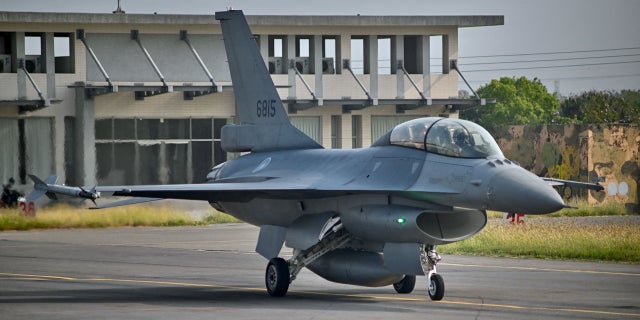
A U.S.-made F-16 V fighter taxis on the runway at an air force base in Chiayi County, Taiwan, on March 25, 2023. The country said Friday it used planes and ships to respond to Chinese aircraft that crossed the Taiwan Strait median line, according to Reuters. (Sam Yeh/AFP via Getty Images)
It reportedly condemned "such irrational actions" and said it responded by deploying its own aircraft and ships to monitor the situation.
"China deliberately raises tensions, but Taiwan always responds cautiously and calmly, so that the world can see that Taiwan is the responsible party in cross-Strait relations," Tsai said in New York on Thursday, according to Reuters.
The White House said Tsai’s trip across the U.S. is "consistent" with the One China policy and is urging Beijing not to overreact.
https://www.foxnews.com/official-po...hina-main-threat-call-biden-too-accommodating
Speaker of the House Kevin McCarthy, left, is expected to meet next week with Taiwanese President Tsai Ing-wen in California. (Jacquelyn Martin/AP/Reuters/Carlos Garcia Rawlins)
National Security Council Strategic Communications Director John Kirby made the statement to reporters during a press briefing at the White House on Wednesday. He pointed out that President Tsai has transited the U.S. six times since gaining office in 2016, and each incident came and went without objection from Beijing.
"There's no reason for them to react harshly," Kirby told reporters, before urging China not to use the incident as an excuse to escalate tensions.
China, led by President Xi Jinping, has been engaged in a territorial dispute with Taiwan. (Lintao Zhang/Getty Images)
Beijing has threatened "resolute countermeasures" should Tsai follow through with a potential meeting with House Speaker Kevin McCarthy during her transit.
Beijing has repeatedly alleged the U.S. and Taiwan are acting in secret to push for Taiwan’s independence and threatened "resolute countermeasures" should the two leaders meet. Tsai is scheduled to meet McCarthy on Wednesday, April 5, when the head of the self-governing island democracy visits Los Angeles.
Fox News’ Anders Hagstrom contributed to this report.
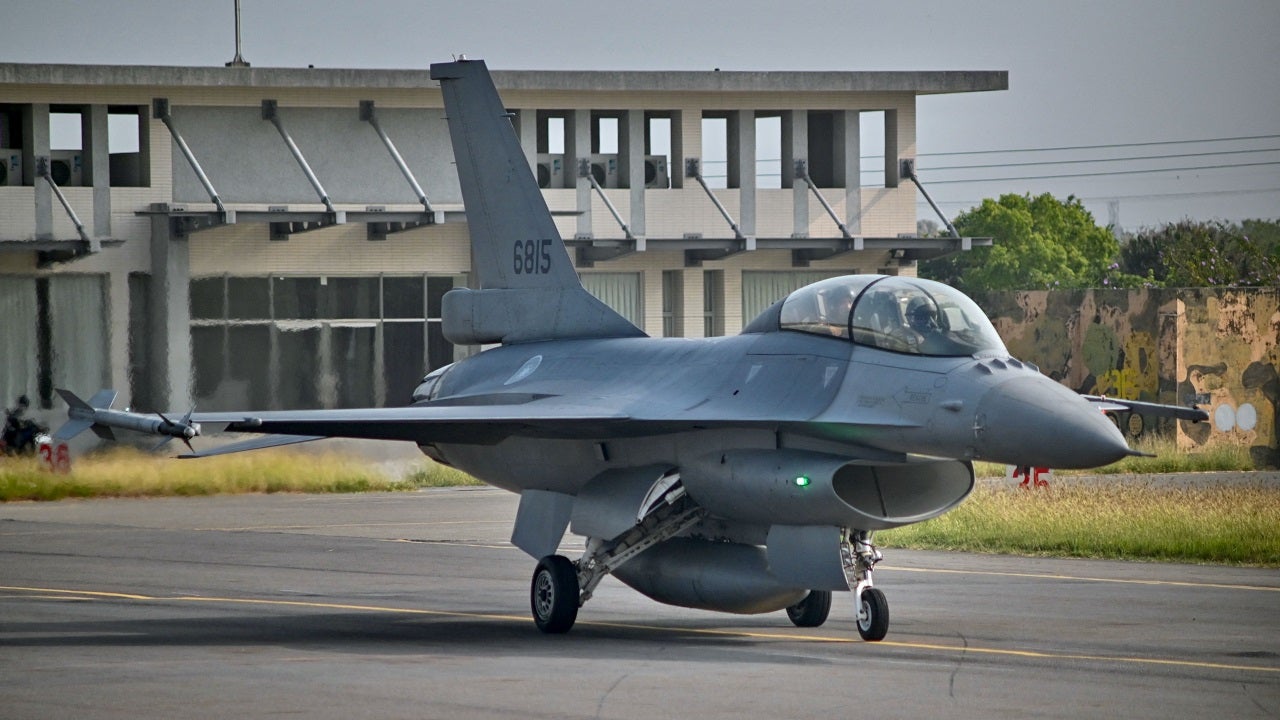
Taiwan scrambles jets, ships after 'irrational actions' by Chinese military
Taiwan says it had to scramble jets and ships Friday to respond to Chinese aircraft that crossed the Taiwan Strait median line during combat readiness drills.
northern watch
TB Fanatic
danielboon
TB Fanatic
Just a matter of time. now where is that clock Jward 

northern watch
TB Fanatic
Taiwan’s military is bolstering its preparation for a possible future war with China by planning an unprecedented military drill at a civilian airport this coming July, the official Central News Agency (CNA) reported.Taiwan speeds up preparation for potential conflict with China
By RFA Staff
Taiwan’s military is bolstering its preparation for a possible future war with China by planning an unprecedented military drill at a civilian airport this coming July, the official Central News Agency (CNA) reported.
The military aircraft emergency landing and takeoff drill will be staged at Taitung Fengnian Airport on the southeast coast of Taiwan.
The scenario is that Taiwan’s military airports and airstrips would be severely damaged in attacks by mainland China, forcing fighter-jets to land at civilian airports or on highways, the CNA quoted an unnamed military source as saying.
The military is looking to turn a section of Highway 9 “into an emergency landing strip” and a section of a road in Taitung County into an emergency runway, the same source said.
Taiwan’s Ministry of National Defense has not commented on the details because of the sensitivity of the issue.
The drill at Taitung Fengnian Airport will be carried out as part of the annual Han Kuang military exercise, held in July.
Han Kuang, Taiwan’s major war games, tests the island’s combat capabilities against a possible Chinese invasion.
China considers the democratic island of Taiwan one of its provinces and intends to reunite with the mainland, by force if necessary.
In response to any major political events or to any support given to Taiwan by its allies, China regularly holds live-fire exercises in the Taiwan Strait or intensifies the flyovers by its military aircraft.
When Nancy Pelosi, the first U.S. House Speaker to visit Taiwan in 25 years, arrived in Taipei last August, Beijing announced a week-long military exercise around the island.
‘No unusual military movements’
Taiwan President Tsai Ing-wen is en route to Central America via the United States, and is to make a stopover in California on her way back to Taiwan from a visit to Guatemala and Belize.
While in California, she is expected to meet with the incumbent U.S. House Speaker Kevin McCarthy.
Beijing has threatened retaliation, with China’s Taiwan Affairs Office spokesperson, Zhu Fenglian, saying that if the meeting took place, China would “definitely take measures to resolutely fight back.”
Yet on Thursday, Taiwan National Security Bureau Director General Tsai Ming-yen told the parliament that “the government expected a less severe reaction” from Beijing than when Pelosi visited Taiwan.
On Friday, the defense ministry said only two Chinese military aircraft and three naval vessels were spotted overnight near Taiwan and none had crossed the median line in the Taiwan Strait that marks the de facto boundary between the island and the mainland.
But on Friday morning, nine PLA aircraft crossed the line, the ministry announced.
U.S. National Security Council spokesman John Kirby on Wednesday urged China not to use Tsai’s transit “as a pretext to step up any activity around the Taiwan Strait.”
Meanwhile, “the Americans are belatedly trying to figure out how to defend Taiwan,” said Grant Newsham, author of a new book on a potential Taiwan conflict, “When China Attacks: A Warning to America.”
“The People’s Liberation Army is capable of launching an assault across the Taiwan Strait, and it – or more importantly, Xi Jinping, thinks it can succeed,” Newsham, a retired Marine colonel who’s extensively studied the cross-strait military situation, told Radio Free Asia (RFA).
“China has been planning and getting ready to invade Taiwan for at least the last few decades,” he said.
“The PLA will hit Taiwan hard and fast while isolating Taiwan electronically and physically,” Newsham added. “It will intimidate the Americans into standing clear.”
In his opinion, the upcoming Taiwan presidential election in January 2024 is particularly important.
“If a ‘pro-China’ candidate wins, Beijing just might back off and rely on their Taiwanese proxies to force Taiwan to give in and accept mainland dominance,” the analyst said.
“But if the candidate that wants to stay free from Chinese communist dominance wins, I would expect Beijing to use force against Taiwan.”

Taiwan speeds up preparation for potential conflict with China
In July, Taiwan’s military will hold its first drill at a civilian airport, turning highway sections into runways.www.rfa.org
This Coming July may be too late, as April weather wise is a good month to invade Taiwan
danielboon
TB Fanatic
Dot this could set it off.PiQ
@PriapusIQ
·
18m
US LAWMAKERS TO MEET WITH TAIWAN’S TSAI, TIM COOK, BOB IGER - BLOOMBERG NEWS

jward
passin' thru
Dot this could set it off.

John Deere Girl
Veteran Member
Does anyone know when this will take place?PiQ
@PriapusIQ
·
18m
US LAWMAKERS TO MEET WITH TAIWAN’S TSAI, TIM COOK, BOB IGER - BLOOMBERG NEWS
danielboon
TB Fanatic
US House speaker to host Taiwan president on Wednesday in California
Reuters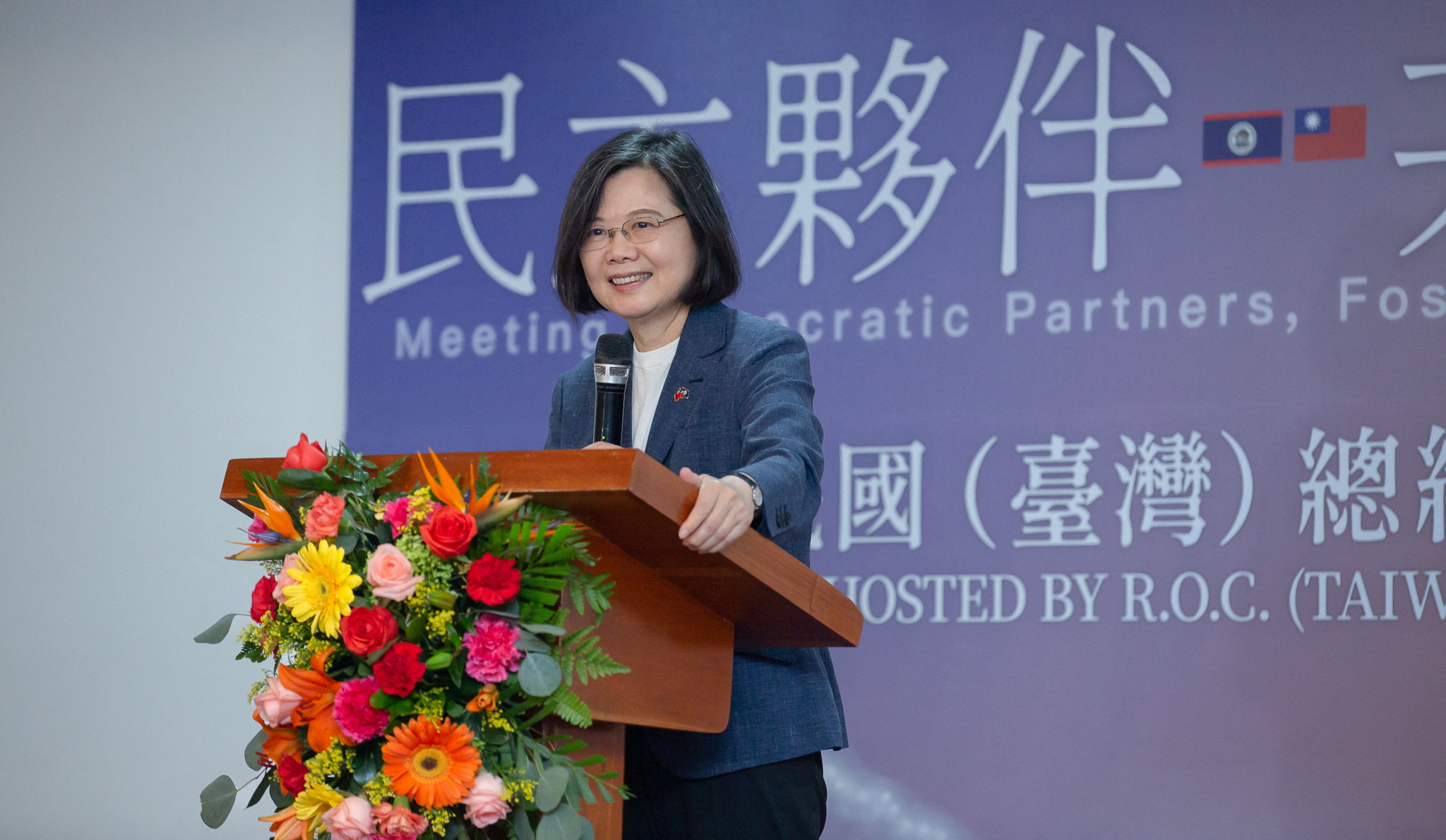
[1/2] Taiwanese President Tsai Ing-wen attends a dinner banquet as she arrives for a visit in Belize, in this handout picture released on April 3, 2023. Taiwan Presidential Office/Handout via REUTERS
12
WASHINGTON, April 3 (Reuters) - U.S. House Speaker Kevin McCarthy will host a meeting in California on Wednesday with Taiwan's President Tsai Ing-wen, his office said, part of a sensitive U.S. stopover that has drawn Chinese threats of retaliation.
China, which claims democratically ruled Taiwan as its own territory, has repeatedly warned U.S. officials not to meet Tsai. She is on her first U.S. stopover since 2019, though Taiwanese presidents have regularly made such trips.
"On Wednesday, April 5th, Speaker Kevin McCarthy will be hosting a bipartisan meeting with the President of Taiwan at the Ronald Reagan Presidential Library," his office said in a statement.
The announcement is official confirmation of what had been a widely anticipated meeting.It will be the first between a Taiwanese leader and a U.S. House of Representatives Speaker on U.S. soil, although it is seen as a potentially less provocative alternative to McCarthy visiting Taiwan, something he has said he hopes to do.
The White House has urged China to not use Tsai's "normal" stopover in the United States as a pretext to increase aggressive activity against Taiwan.
"During transits through the U.S., the President engages with American friends, in line with past precedents," Taiwan's de facto embassy in Washington said without elaborating when asked about the meeting. US House speaker to host Taiwan president on Wednesday in California
jward
passin' thru
Helen Raleigh
@HRaleighspeaks
2m
A big deal - “these new locations will strengthen the interoperability of the U.S. and Philippine Armed Forces and allow us to respond more seamlessly together to address a range of shared challenges in the Indo-Pacific region”- i.e., China’s possible invasion of #Taiwan
View: https://twitter.com/HRaleighspeaks/status/1642961840551649280?s=20
@HRaleighspeaks
2m
A big deal - “these new locations will strengthen the interoperability of the U.S. and Philippine Armed Forces and allow us to respond more seamlessly together to address a range of shared challenges in the Indo-Pacific region”- i.e., China’s possible invasion of #Taiwan
View: https://twitter.com/HRaleighspeaks/status/1642961840551649280?s=20
jward
passin' thru
(Note: All these sites except for the one in Palawan are up at the northern tip of the Philippines near Taiwan)
Carla Babb
@CarlaBabbVOA
#BREAKING Pentagon announces the 4 US / #Philippines military sites under the Enhanced Defense Cooperation Arrangement:
1- Naval Base Camilo Osias in Santa Ana, Cagayan
2-Camp Melchor F. Dela Cruz in Gamu, Isabela
3-Balabac Island in Palawan
4- Lal-lo airport in Cagayan
1:16 PM · Apr 3, 2023
Carla Babb
@CarlaBabbVOA
#BREAKING Pentagon announces the 4 US / #Philippines military sites under the Enhanced Defense Cooperation Arrangement:
1- Naval Base Camilo Osias in Santa Ana, Cagayan
2-Camp Melchor F. Dela Cruz in Gamu, Isabela
3-Balabac Island in Palawan
4- Lal-lo airport in Cagayan
1:16 PM · Apr 3, 2023
Helen Raleigh
@HRaleighspeaks
2m
A big deal - “these new locations will strengthen the interoperability of the U.S. and Philippine Armed Forces and allow us to respond more seamlessly together to address a range of shared challenges in the Indo-Pacific region”- i.e., China’s possible invasion of #Taiwan
View: https://twitter.com/HRaleighspeaks/status/1642961840551649280?s=20

